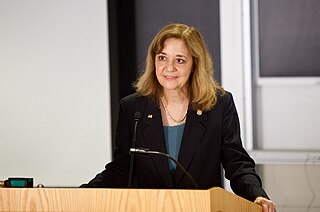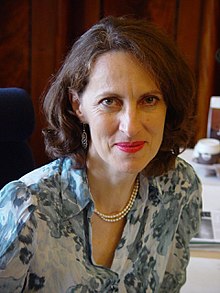
The United Nations Environment Programme (UNEP) is responsible for coordinating responses to environmental issues within the United Nations system. It was established by Maurice Strong, its first director, after the United Nations Conference on the Human Environment in Stockholm in June 1972. Its mandate is to provide leadership, deliver science and develop solutions on a wide range of issues, including climate change, the management of marine and terrestrial ecosystems, and green economic development. The organization also develops international environmental agreements; publishes and promotes environmental science and helps national governments achieve environmental targets.

A conventional idea of a sustainable fishery is that it is one that is harvested at a sustainable rate, where the fish population does not decline over time because of fishing practices. Sustainability in fisheries combines theoretical disciplines, such as the population dynamics of fisheries, with practical strategies, such as avoiding overfishing through techniques such as individual fishing quotas, curtailing destructive and illegal fishing practices by lobbying for appropriate law and policy, setting up protected areas, restoring collapsed fisheries, incorporating all externalities involved in harvesting marine ecosystems into fishery economics, educating stakeholders and the wider public, and developing independent certification programs.

The goal of fisheries management is to produce sustainable biological, environmental and socioeconomic benefits from renewable aquatic resources. Wild fisheries are classified as renewable when the organisms of interest produce an annual biological surplus that with judicious management can be harvested without reducing future productivity. Fishery management employs activities that protect fishery resources so sustainable exploitation is possible, drawing on fisheries science and possibly including the precautionary principle.

Brynhildur Davíðsdóttir is a professor of environment and natural resources at the University of Iceland and the academic director of the Environment and Natural Resources graduate programme as well as the director of University of Iceland Arctic Initiative.
The Lancaster Environment Centre (LEC) in Lancaster, England, is an interdisciplinary centre for teaching, research and collaboration at Lancaster University, founded in 2007.

The Economics of Ecosystems and Biodiversity (TEEB) was a study led by Pavan Sukhdev from 2007 to 2011. It is an international initiative to draw attention to the global economic benefits of biodiversity. Its objective is to highlight the growing cost of biodiversity loss and ecosystem degradation and to draw together expertise from the fields of science, economics and policy to enable practical actions. TEEB aims to assess, communicate and mainstream the urgency of actions through its five deliverables—D0: science and economic foundations, policy costs and costs of inaction, D1: policy opportunities for national and international policy-makers, D2: decision support for local administrators, D3: business risks, opportunities and metrics and D4: citizen and consumer ownership.

Rosina M. Bierbaum is currently the Roy F. Westin Chair in Natural Economics and Research Professor at the University of Maryland's School of Public Policy. She is also a professor and former dean at the University of Michigan School of Natural Resources and Environment (SNRE). She was hired in October 2001, by then-University of Michigan President, Lee Bollinger. She is also the current Chair of The Scientific and Technical Advisory Panel (STAP) that provides independent scientific and technical advice to the GEF on its policies, strategies, programs, and projects.
The Leibniz-Zentrum für Marine Tropenforschung (ZMT) in Bremen is a German institute for research and developments for tropical and subtropical coastal areas and ecosystems.

Hans Rudolf Herren is a Swiss American entomologist, farmer and development specialist. He was the first Swiss to receive the 1995 World Food Prize and the 2013 Right Livelihood Award for leading a major biological pest management campaign in Africa, successfully fighting the cassava mealybug and averting a major food crisis that could have claimed an estimated 20 million lives.
Tundi Agardy is a marine conservationist and the founder of Sound Seas – a Washington DC-based group specializing in working at the nexus of marine science and policy in order to safeguard ocean life.

Hans Emiel Aloysius Bruyninckx is a Belgian political scientist and international relations scholar specialized in international environmental governance and European environmental politics. He has headed the European Environment Agency since 2013. While in this position, he is on leave from his posts as Professor of International Relations and Global Environmental Governance, Institute for International and European Policy; and Director, Research Institute for Work and Society, both at the Katholieke Universiteit Leuven.

Tan Sri Zakri bin Abdul Hamid has had a distinguished career in science as a researcher, educator, administrator and diplomat.

Anitra Thorhaug is an American marine biologist, plant ecophysiologist and chemical oceanographer whose extensive work on the rehabilitation of coastal ecosystems has had a substantial influence on national and international policies on conservation around the world. She is president of the Greater Caribbean Energy and Environment Foundation, and president of the Institute for Seagrasses. She has had a series of professorships at universities and presently works at The Institute of Sustainable Forestry Ecophysiological Laboratories at the Yale School of Forestry & Environmental Studies. She is a member of the International Club of Rome and has twice been president of the US Association of the Club of Rome.

The contributions of women in climate change have received increasing attention in the early 21st century. Feedback from women and the issues faced by women have been described as "imperative" by the United Nations and "critical" by the Population Reference Bureau. A report by the World Health Organization concluded that incorporating gender-based analysis would "provide more effective climate change mitigation and adaptation."
Madhur Anand is a Canadian poet and professor of ecology and environmental sciences. She was born in Thunder Bay, Ontario and lives in Guelph, Ontario.

Diana Harrison Wall was an American environmental scientist and a soil ecologist. She was the founding director of the School of Global Environmental Sustainability, a distinguished biology professor, and senior research scientist at the Natural Resource Ecology Laboratory at Colorado State University. Her research focussed on the Antarctic McMurdo Dry Valleys. Wall investigated ecosystem processes, soil biodiversity and ecosystem services and she was interested in how these are impacted by global change. Wall Valley was named after her in recognition of her research in the McMurdo Dry Valleys. Wall was a globally recognized leader and speaker on life in Antarctica and climate change. Diana Wall died on March 25, 2024.
Irena Creed is a Canadian hydrologist. She is the Vice-Principal for Research and Innovation at University of Toronto Scarborough in Toronto, Canada, and was formerly the Associate Vice-President for Research at the University of Saskatchewan, and the Executive Director of the University of Saskatchewan's School of Environment and Sustainability in Saskatoon, Canada. Creed studies the impacts of global climate change on ecosystem functions and services, often focusing on the hydrology of freshwater wetlands and catchments.

Kerrie Ann Wilson is an Australian environmental scientist who is the Queensland Chief Scientist and a Professor in the Faculty of Science at Queensland University of Technology (QUT). She was formerly the Pro Vice-Chancellor at QUT. Wilson is also an affiliated professor in conservation science at the University of Copenhagen, honorary professor at The University of Queensland, a member of the Australian Heritage Council and the Australian Natural Sciences Commissioner for UNESCO.
Leah R. Gerber is a conservation biologist and environmental scientist most known for her contributions to the field of biodiversity conservation. She has conducted research on population ecology, conservation decision-making, and the application of innovative quantitative methods in conservation biology.
Beatrice Crona is an ecologist, a professor at Stockholm University, and the Executive Director of the Program on Global Economic Dynamics and the Biosphere at the Royal Swedish Academy of Sciences. In 2023 she became a Science Director of the Stockholm Resilience Centre.













